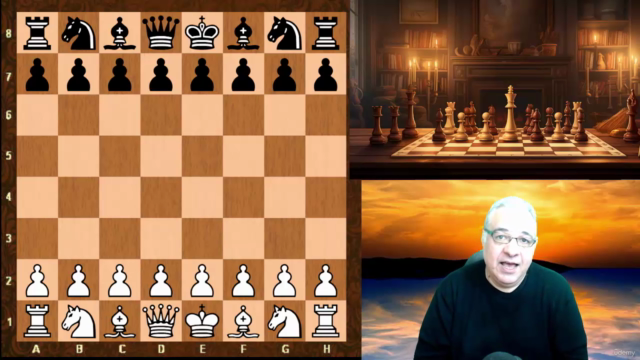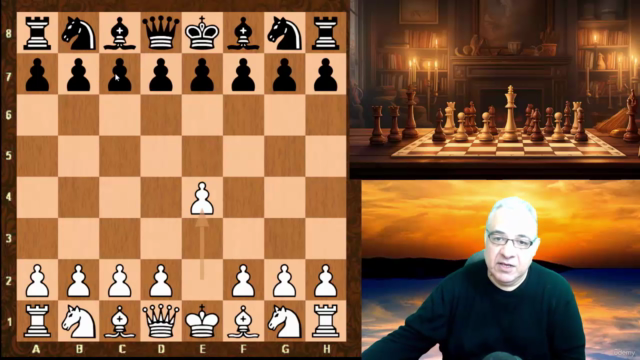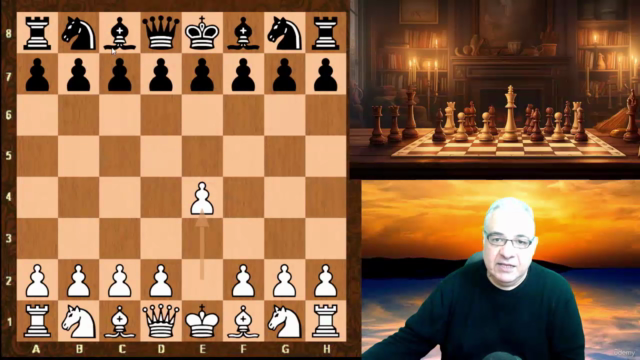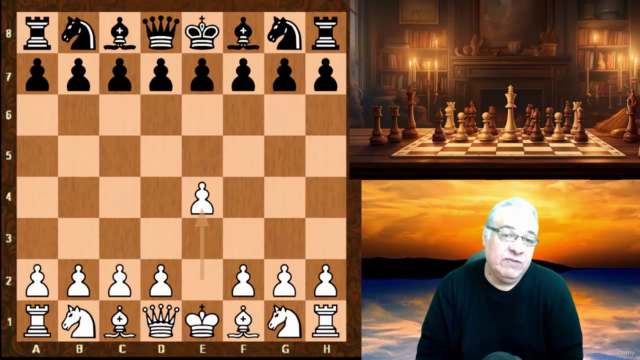Complete Fun & Easy Chess Repertoire for Beginners (0-1600)
Learn a complete 1.e4 Chess Opening repertoire: Fun & easy, with traps, plans, and strong replies to all Black defenses
5.00 (3 reviews)

51
students
15.5 hours
content
May 2025
last update
$19.99
regular price
What you will learn
Ability to confidently play 1.e4 with a full, structured repertoire.
Ability to punish common mistakes in the Scotch Game.
Ability to handle the Philidor Defence with central pressure and tactics.
Ability to exploit early inaccuracies in the Petrov Defence.
Ability to apply key opening principles: development, central control, king safety.
Ability to apply development with purpose in every variation.
Ability to avoid mainline overload and still play principled, aggressive chess.
Ability to punish delayed castling and uncoordinated development.
Ability to handle the Sicilian Defence with the Grand Prix Attack.
Ability to respond powerfully to the Scandinavian Defence with the Blackmar Diemer Gambit
Ability to play the Fantasy Variation against the Caro-Kann Defence.
Ability to use the Reti Gambit against the French Defence.
Ability to control the centre with effective pawn and piece play.
Ability to castle early and prioritize king safety.
Ability to apply tactical motifs like forks, pins, and f7 pressure.
Ability to transition smoothly from opening to middlegame.
Ability to recognize statistical frequencies to prioritize prep.
Ability to punish trap-based or speculative Black openings.
Ability to convert initiative into long-term positional gains.
Ability to simplify into better endgames from strong openings.
Ability to use model games from Morphy, Kasparov, Nakamura as reference.
Ability to challenge rare Caro-Kann fantasy setups like ...Qb6, ...g6, ...Nd7.
Ability to punish declined Blackmar Diemer Gambit lines with practical ideas.
Ability to exploit weak squares like e6 or f7 early in the game.
Ability to punish passive moves in lines like the Steinitz Defence.
Ability to avoid moving the same piece twice unnecessarily.
Ability to launch attacks in the Modern/Pirc using the Austrian Attack.
Ability to exploit speculative gambits like Elephant and Latvian.
Ability to punish Closed Sicilian setups like 2...e6 or 2...d6 as well as the more common 2...Nc6.
Ability to use the Bb5 anti-Sicilian system with clarity.
Ability to exploit ...Nc6 Sicilian setups with quick central play.
Ability to use move-order tricks to stay within safe prep zones.
Ability to feel confident in both classical and blitz time controls.
Ability to punish premature queen moves like Qh4, Qf6, or Qxa2.
Ability to punish early c5 or b6 moves in lesser-played defences.
Ability to spot transpositions and return to familiar territory.
Ability to exploit early ...d4 pushes by Black in the Ret Gambit French.
Ability to exploit delayed development in the Owen’s Defence.
Ability to play against the Alekhine Defence with solid central control.
Ability to challenge the Alburt and Larsen-Haakert variations in Alekhine.
Ability to counter Nimzowitsch Defence and punish the Colorado Gambit.
Ability to exploit weaknesses in St. George (1...a6) lines.
Ability to confidently handle rare defences in Blackmar Diemer Gambit like Bogoljubov or Ziegler.
Ability to create threats naturally through development.
Ability to avoid memorisation-heavy theory while keeping solid footing.
Ability to prepare with real-world frequency in mind, not just theory.
Ability to think in themes and ideas rather than rote lines.
Ability to play with initiative as a central game plan.
Ability to build consistent confidence with every 1.e4 game.
Ability to use familiar pawn structures to guide plans.
Ability to evolve this repertoire as your strength increases.
Ability to punish Black’s failure to contest the centre.
Ability to reach attacking positions in under 10 moves.
Ability to avoid traps while setting practical ones yourself.
Ability to maintain flexibility against early deviations.
Ability to gain psychological advantage through preparation.
Ability to play cleanly against rare but dangerous traps.
Ability to bring creativity within a principled framework.
Ability to enjoy chess more through structure and readiness.
Ability to use this repertoire in nearly every 1.e4 game played.
Course Gallery




Loading charts...
6587653
udemy ID
28/04/2025
course created date
05/06/2025
course indexed date
Bot
course submited by